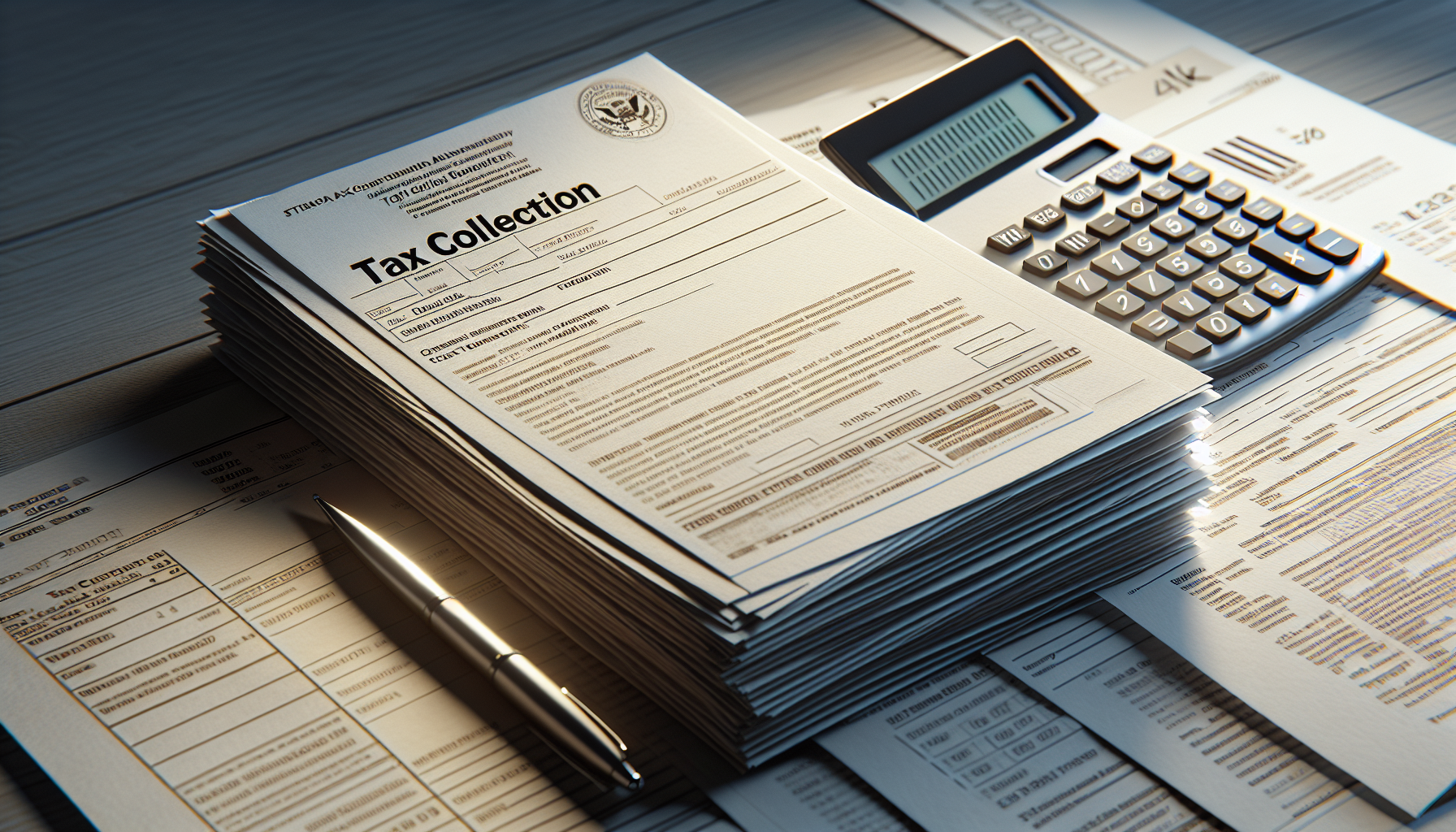
Understanding the basics of a tax levy, which encompasses measures like federal income attachment, is a crucial step for taxpayers. When one neglects to settle federal taxes, the IRS may enforce paycheck seizure, a daunting prospect that impacts your financial well-being.
This debt collection method is often a consequence of disregarding initial IRS communications, underscoring the urgency for you to respond swiftly.
Proactive measures, such as engaging with the IRS to reassess employer withholdings and configuring a payment blueprint, can serve as a bulwark against wage garnishment.
Should the IRS enact collections via garnishment, by legal imperative, an employer is bound to adhere to the agency’s demands, diverting a fraction of an employee’s salary toward debt liquidation. The legal ramifications of debt collection methods, such as tax levy, paycheck seizure, and federal income attachment, require employers to comply with withholdings from an employee’s salary as part of the collections process.
“Click here to learn more about:” file7file13.com
Understanding Tax Levy The Basics of IRS Garnishment
When individuals neglect or are unable to pay their back taxes, the Internal Revenue Service (IRS) may implement tax debt recovery measures. An intimidating method often employed is a wage levy release.
This action mandates employers to withhold a portion of an employee’s earnings, which is then used to pay off the outstanding tax liability.
Known as paycheck garnishment, this legal procedure can significantly reduce your disposable income, making it more challenging to meet your financial obligations.
Before the IRS resorts to such a measure, it follows a strict protocol, including sending multiple notices to the taxpayer, alerting them of the salary attachment and providing an opportunity to rectify the situation. If these warnings are disregarded, the IRS will proceed with the payroll deduction process. During this process, a predetermined fraction of your wages is deducted each pay period and applied directly toward the tax debt, persisting until the debt is fully satisfied, ensuring a methodical approach to back taxes recovery through paycheck garnishment.

Dealing with Paycheck Seizure Your Rights and Remedies
Facing a payroll garnishment can be a daunting experience, but being informed about the enforcement action associated with this obligation enforcement process is crucial in mitigating its impact. Federal and state garnishment laws are in place to offer you protection, ensuring that wage execution procedures adhere to legal limits and do not cause undue financial hardship.
It is your right under these laws to receive proper notification before any garnishment takes effect.
This due process allows you to understand the reasons behind the enforcement action and provides an opportunity to contest it, a critical step in safeguarding your interests.
If you find that a garnishment has been authorized against your earnings, seeking professional debt settlement advice may uncover alternative resolutions that are less damaging to your financial health.
In anticipation of or in response to payroll garnishment, actively managing your finances is imperative. By establishing payment plans or engaging in debt settlement negotiations, you can work to mitigate the consequences of enforcement action, fulfill your financial obligations more manageably, and potentially avoid the harsher outcomes of garnishment laws, like wage execution or payroll garnishment.
Key Points on Payroll Garnishment
- Federal and state laws limit the amount that can be garnished from wages to prevent excessive financial burden.
- Individuals are entitled to receive a formal notice before garnishment begins, allowing them the opportunity to challenge it.
- Professional debt advisors may offer alternative solutions to garnishment, such as debt settlement or payment plans.
- Proactive financial management can reduce the impact of payroll garnishment and help avoid future legal action.
Navigating Federal Income Attachment What You Need to Know
Navigating federal income attachment is crucial for those grappling with delinquent taxes that have escalated beyond simple notices to more severe legal repercussions. If you find yourself with unpaid taxes, the journey may eventually lead to a garnishment order from the Internal Revenue Service (IRS).
This withholding order mandates your employer to subtract a designated fraction of your earnings to settle the tax liability.
To deter the progression to wage attachment, it’s imperative that you remain alert for any deduction notice or preliminary communications from the IRS indicating possible enforcement action.
By responding swiftly to these early warnings, you could engage tax resolution services, which might help you sidestep the imposition of wage garnishment.
Resolving tax debts before an attachment is enforced often entails negotiating installment agreements or seeking guidance from tax professionals who are adept at navigating these complex situations. Should a garnishment order already be active, it’s essential to comprehend that this legal deduction notice could stem from delinquent taxes, potentially leading to a tax lien, and that seeking tax resolution services may be necessary to navigate the complexities of such withholding orders.
Employer Withholdings How Your Paycheck Gets Garnished
When an employer receives a government debt collection notice mandating wage garnishment, they are instantly placed in a position where legal compliance is non-negotiable. Acting as an intermediary for tax help, the employer must then engage in the income levy procedure, which involves reducing an employee’s paycheck by a specified amount.
This process is strictly governed by legal guidelines, and the employer is required to meticulously calculate the deduction as prescribed in the removal notice.
Such notices often pertain to outstanding liabilities, including federal or state taxes, as well as other debts like unpaid child support or student loans.
To navigate this complex situation and engage in prevention of legal repercussions, it is critical that employers pay close attention to the details outlined in the garnishment or attachment order documentation. Abiding by these exact instructions is essential for the dual goals of adhering to the law and protecting the employer from potential fines associated with government debt collection, tax help, removal of income levy, prevention of asset seizure, and compliance with attachment orders.
Key Points on Wage Garnishment Compliance
- Legal compliance with wage garnishment is mandatory for employers upon receipt of a government debt collection notice.
- Employers must accurately calculate and deduct the specified amount from the employee’s paycheck as per the garnishment order.
- Wage garnishments are used to collect various debts, including unpaid taxes, child support, and student loans.
- Failure to adhere to garnishment orders can result in fines and legal consequences for employers.
Breaking Down Debt Collection Methods IRS Strategies Explained
In navigating the complexities of overdue tax balances, the IRS utilizes its robust Automated Collection Systems (ACS) to ensure efficient management. This often results in a ‘repayment plan’ being proposed for taxpayers who find themselves unable to settle their debt promptly and in full.
Such an arrangement can be a viable solution, offering a structured approach to gradually clearing the outstanding amount.
Should tax obligations remain unaddressed, the IRS may escalate enforcement, leading to a ‘paycheck levy’.
This powerful action permits the agency to garnish a portion of your earnings, a measure that can significantly impact financial well-being. It’s pivotal to comprehend the mechanics behind this method to adequately prepare for or prevent such an outcome.
Fortunately, ‘garnishment exemption’ rules could serve as a financial safeguard for the taxpayer. These provide a limit to the extent of what can legally be extracted from your wages, ensuring that settlement companies respect the garnishment exemption while dealing with a paycheck levy or repayment plan for garnished wages.
Back Taxes Blues Can You Prevent Wage Garnishment
When grappling with the daunting landscape of federal debt relief, individuals who are behind on their tax obligations may face the anxiety-inducing prospect of their wages being garnished. For many, lien withdrawal stands as a constant threat, a reminder from tax authorities of possible stringent measures that may be taken against them, including the onset of seizure actions which understandably triggers distress.
Empowering oneself with knowledge can significantly alter the course of events.
Becoming familiar with the garnishment calculator and its rules offers the ability to anticipate the financial impact this could have on your income.
With this estimation, one can create a proactive strategy to address the looming issue.
A pivotal element in crafting this strategy is negotiation.
This isn’t merely about having a dialogue with the tax authorities; it involves engaging promptly and efficiently with the IRS or your local tax agency before the onset of debt garnishment. Prompt action can facilitate lien withdrawal, enable access to federal debt relief, ensure accurate use of a garnishment calculator, adhere to the rules of negotiation, and ultimately prevent or reduce debt garnishment.
| Financial Impact of Wage Garnishment | Benefits of Early Negotiation |
|---|---|
| Percentage of wages subject to garnishment | Potential for lien withdrawal |
| Estimated reduction in take-home pay | Access to federal debt relief programs |
| Maximum garnishment cap by law | Prevention or reduction of debt garnishment |
Wage Levy Release How to Liberate Your Earnings from the IRS
When confronting the daunting challenge of an IRS wage levy, taking immediate action is paramount for securing relief assistance. To safeguard your earnings, meticulously review the levy notice to ensure its accuracy and assert your rights against involuntary income garnishment.
Verify the legitimacy of the alleged debt, as overlooking this step could unjustly impact your finances.
Engaging in a prompt dialogue with the IRS is a crucial step to release your finances from the hold of the levy.
In these discussions, clearly outline your financial situation, demonstrating a sincere commitment to address the tax issue. This helps establish a basis for negotiation and may lead to potential solutions.
Considering an installment agreement with the IRS is a strategic move that can provide breathing room. This arrangement could temporarily suspend the levy, allowing you to make manageable payments over time, which is vital for maintaining financial stability. If penalty fees have exacerbated your debt, investigate penalty abatement options, seek relief assistance, understand your rights to release from involuntary collection, and consider an installment agreement to manage your payments.
Know Your Options Negotiating a Repayment Plan with the IRS
When you find yourself labeled as a delinquent taxpayer, staring down the intimidating prospect of dealing with the IRS can provoke significant stress. This is especially true if you’re at risk of defense mechanisms such as income garnishment being initiated.
Understanding the full spectrum of options available to you is critical in these situations.
It is essential to thoroughly assess your financial standing to ascertain whether you are eligible for an installment agreement with the IRS, a strategy that could thwart the onset of agency collections.
Open and proactive communication with the IRS could very well be your shield against aggressive collection tactics such as payroll levy. In the event that enforced collection measures have already begun, remember that you possess the right to appeal and enter into negotiations for a repayment plan that is consistent with your financial capacity.
For many, navigating these waters alone can be overwhelming. Thus, seeking the aid of a professional can be a crucial defense against income garnishment, payroll levy, agency collections, and can provide assistance to a delinquent taxpayer looking to appeal.
Key Information for Delinquent Taxpayers
- Installment agreements with the IRS can prevent the initiation of collection actions for eligible taxpayers.
- Taxpayers have the right to appeal against enforced collection measures and negotiate payment plans that align with their financial capabilities.
- Proactive communication with the IRS may prevent aggressive collection actions such as payroll levies.
- Professional assistance can be invaluable in managing complex tax situations and avoiding income garnishment.

Get a Free Bankruptcy Case Evaluation